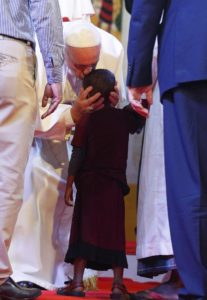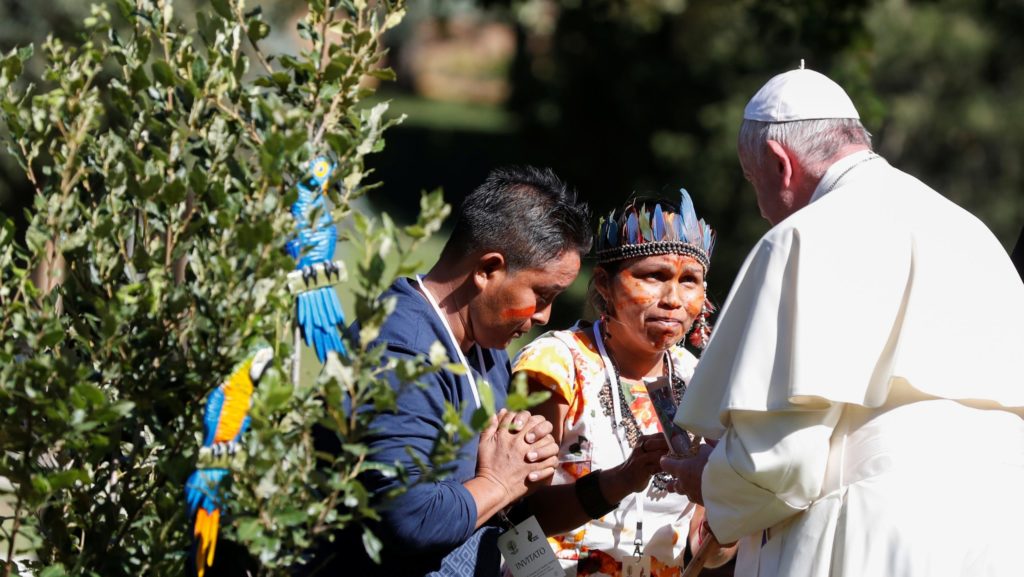In his biography of Pope Francis, British journalist Austin Ivereigh recalls a telling conversation with an Argentinian Jesuit about Father Bergoglio’s ministry style.
The colleague notes “The people that could expect a dressing down from him were those who wanted people to know how good and perfect they were. … Conversely, he responded to fragility with a sensitivity I don’t think I’ve ever seen in anyone else. If you could apply some kind of mathematical rule to Bergoglio, I’d say, the greater the fragility, the greater the response from him.”
That “field hospital” concept of the Catholic Church sums up Francis’ life in ministry, from beginning to end. But it was also the heart of his most important teachings.
Pope Francis’ two social encyclicals, “Laudato Si” (“Praise be to you, my Lord"), in 2015, and “Fratelli Tutti” (“All Brothers”), in 2020, will endure as the most important teaching legacies of his pontificate. At their center is the pope of the tender encounter with fragility and suffering … with a “dressing down” for those who claim piety but ignore this suffering.
When in “Laudato Si,” the pope identified the earth as “the most abandoned and maltreated of our poor,” crying out “because of the harm we have inflicted on her by our irresponsible use and abuse,” he was criticized by some for using his platform to teach “too much” on the environment.
But Francis was only following in the footsteps of his predecessors: In 1987, St. Pope John Paul II wrote that we cannot “use with impunity” the goods of creation, and in 2009 Pope Benedict XVI devoted a section of his encyclical, “Caritas in Veritate,” on the importance of respecting “the grammar of creation,” a prior order written by God whom we rejected when we rejected the ordering.
But Francis recognized that “the environmental question” needed a full document, just as Pope Leo XIII did with “Rerum Novarum” (“On the New Things”) in 1891, which looked around at brutal, inhumane factories of his age. In response, he wrote a full document on “the worker question,” remembered by history as inaugurating the papal tradition of speaking on social crises. Why does the Church need to speak? Because there is a lot of suffering going on, and the Church cares about the suffering.
But the reason for speaking is not only that. Pope Leo also thought that the available answers in the society at the time — unrestrained capitalism and total socialism — were bad answers, and that the Church had to correct those answers and offer a better vision for the world.
That’s also what Pope Francis did in “Laudato Si'.” The earth is being pillaged and imperiled, and what do we do? In a section on our “weak responses,” the pope criticizes a “superficial ecology” that pretends things are not so bad, so that we have “a license to carry on with our present lifestyles.” We don’t recognize the fundamental truth that “we are not God.” This is because we are stuck in what he called “the technocratic paradigm,” a way of thinking and acting in which humans believe they are capable of anything (including solving any environmental problems) through technological solutions. But while science and technology produce many good things, Francis warns, these solutions “are not neutral” and involve people using power to prioritize a certain vision of society.
The alternative he offers to the world is integral ecology. Inspired by the teaching of St. Pope Paul VI on “integral human development,” Francis insists on a vision of society in which “everything is connected” — in which species and people and the atmosphere live in an integrated whole, in harmony with God and one another.
An integral ecology brings together science and social thought, the cry of the earth and the cry of the poor, to develop ways of living together in our common home that are sustainable.
It’s a concept that challenges today’s political debates about the environment, which often pit the good of people and the good of the planet against one another. Both forget God, Francis argued, and both forget the need to find lifestyles of harmonious cooperation in daily life.
Of course, addressing the crises requires important global cooperation — it was no accident that the encyclical was written before the 2015 talks that produced the Paris Climate Agreement. But even more importantly, it requires a spiritual conversion. The pope writes approvingly of the need for the virtue of sobriety. He rejects our “obsession with consumption,” when we are “always on the lookout for what [we] do not have”; sobriety means we learn “to be happy with little,” learning “to appreciate each person and each thing, learning familiarity with the simplest things and how to enjoy them.”
For a person who cultivates this virtue, Francis says, “even living on little, they can live a lot.” Here is the tenderness with fragility: If we cannot cultivate that in daily life, all the technology and global agreements won’t solve the problem of our relentless consumption of the planet.

The idea of daily tenderness is also at the center of his other social encyclical, “Fratelli Tutti.” In the face of rising nationalisms and the devastation of the COVID-19 pandemic, the pope calls for a politics of brotherly and sisterly love modeled after the parable of the Good Samaritan, the ultimate story of being open to the stranger who suffers. The pope suggests that the images of “openness” or “closedness” in the parable describe the two stances we can take toward each other — as individuals, but also as nations.
Like Pope Leo once did, Francis’ social thought here also challenges two false solutions in today’s world. This time, a “nationalism” that rejects the stranger in a bid to protect its own cultural heritage, and a globalism that makes every place and people in the world “the same,” as it jets between rich cities like London, New York, and Singapore. Instead, Francis argues that truly strong cultures are ones that know and love their own identity and heritage, and are open to fruitful encounters with the stranger. In other words, a “culture of encounter.”
“Fratelli Tutti” also proposes reciprocity — the exchange of genuine cross-cultural gifts — as the way to overcome zero-sum conflicts between nations. He urges a “culture of encounter” that becomes “deeply embedded within a people” that makes us “passionate about meeting others, seeking points of contact, building bridges, planning a project that includes everyone.”
But just as “Laudato Si'” insists that forgetting God is at the heart of the problem, he concludes “Fratelli Tutti” by saying “without an openness to the Father of all, there will be no solid and stable reasons for an appeal to fraternity.”
His ability to unite global vision and local action to address modern suffering made Francis a particularly effective and powerful teacher. In 2025, the concept of integral ecology seems even more prophetic as conventional politicians and business leaders turn away from them while ignoring the consequences.
Francis’ teachings are not about the latest op-eds or swings in political polls. They are about the lasting and different vision for life — applicable to everyday human relationships and to our biggest global problems — that the Catholic tradition offers to a wounded world very much in need.

